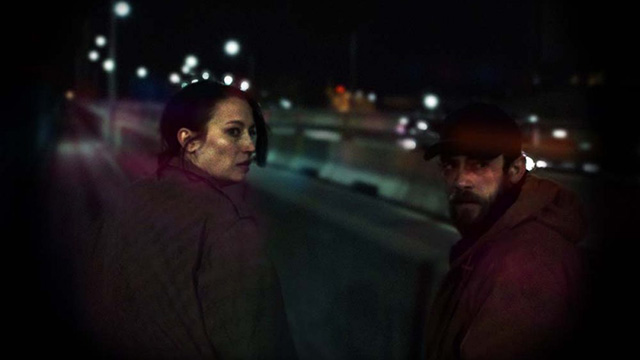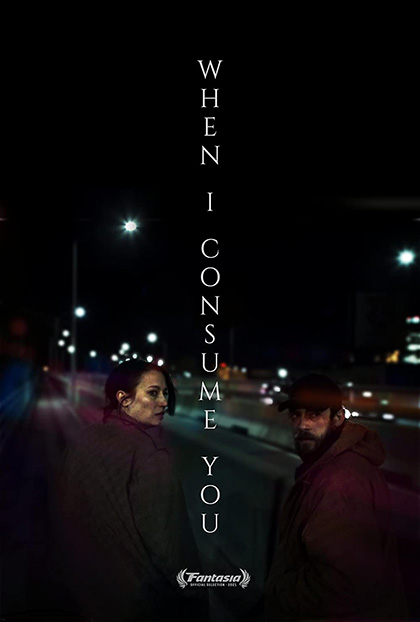

Sunday November 7, 2021 | Dan Yeager Reviews | Neal
A Review of
"When I Consume You"
by Dan "Leather Face" Yeager
When I Consume You is a dark tale of the evils of drugs and the importance of love. It was written, produced, and directed by Perry Blackshear. It's chock-full of lofty themes and shows lots of potential that never really manifests. There's something lurking beneath the surface, but it never seems to reach the screen.
You don't get into the movie reviewing game unless you really love movies. And as a movie lover, you're often loathe to call a stinker a stinker because you never want to discourage either the film-goer or the filmmaker from pursuing the art in any of its forms. The worst movie I had seen before my 25th birthday was Tarzan the Ape Man with the early '80s bombshell, Bo Derek. As a movie, it was an excuse to ogle Bo, which may have been the limits of her talent as an actress. I don't know. I've never been sufficiently intrigued by her to investigate. Certainly, her husband and filmmaker, John Derek, was. I realized it was the worst movie I'd ever seen because it was the first movie I'd ever walked out on. I was 17 years old and the movie didn't compel me to stick around for the ending, and as my friends will tell you, I am the guy who sits through the end credits out of respect for the filmmakers.
At 25, I witnessed a stinker called Two Moon Junction which unseated Tarzan from his throne of badness. Again, the excuse for making the movie was an obsession with a beautiful woman, in this case, the stunning Sherilyn Fenn, truly one of the most beautiful humans to ever grace the silver screen.
I tell you this so you know where I'm coming from. I love movies, even bad ones, and that makes me perhaps the greatest poltroon among movie reviewers. If I had a gimmick like Siskel and Ebert with the thumbs up and thumbs down, my coward's thumbs would always be up, because even bad movies are worth watching.
The distributors of the current subject here, Yellow Veil Pictures, declare themselves to be “focusing on boundary-pushing genre cinema...” and that's something I think we can all support. This one does push some boundaries, but they don't seem to have moved in any positive direction.
The movie's main theme seems to be that drugs are not only bad, they're evil incarnate. This is wrapped in some Buddhist philosophy and a rather on-the-nose William Blake quote, but it doesn't add up to a movie that will move you in any particular way.
The movie labors under the constraint of a too-small budget. If you've ever read any of the books or seen the online workshops about “How to make your feature movie for no money”, you'll recognize many of the elements of this picture. It is a master-class of low-budget film-making. Keep the cast small, the locations cheap and close together, shoot a lot of close-ups and inserts that fill the screen.
I never criticize scripts unless I've read them. What we see on the screen is not always an accurate representation of the writer. While you'll never make a great movie from a badly written script, you can make a bad movie from a great script. I haven't read this one, but this movie depends upon our immediate connection with these characters, and we're given very little to work with. Perhaps if you've had a loved one who struggled with drug addiction and behavioral disorders, you'd have more empathy than I did. Or, perhaps you're a better human being than I am, which is why I always encourage people to see the damned movie despite the reviews. I will say that giving every extra a name in the end credits (see, I watched them) is no substitute for character development.
Back to what it was about, there's a brother and sister in their 20s who are still very close because of their traumatic childhood. We know this because we are repeatedly shown pictures of them as youngsters while being told some element of the back-story. They both suffer from drug addiction, which is initially personified by this dark-hoodied figure we are led to believe is a stalker, but who eventually reveals himself to be a full-fledged demon who consumes the souls of the weak. The Rocky-esque raw-egg-eating/fighter-training scenes were kind of amusing, but I never knew how seriously I was supposed to take them. The character, Wilson, the brother (very engagingly played by actor/producer Evan Dumouchel) has an arc like a roller-coaster. He goes from quivering junky to martial artist/streetfighter with stops at nurturing philosopher and bumbling PTSD sufferer along the way. His sister, Daphne, goes through a similarly varied range, though in a boundary-pushing sequence that doesn't follow any convention I could discern. Actor/producer Libby Ewing plumbs the depths of the character admirably.
I always like to preface my reviews with the disclosure as to how I screened the movie, whether on the big screen or on a television. I know it's a little late in the essay for a preface, but in this case, I watched it on a television, which seems to be where these filmmakers learned their craft. I am not at all sure how this movie will play projected large. The combination of shaky camera work and often out-of-focus composition could be a strain. I can see how it would add to your feeling of unease, but I'm not a fan of motion sickness.
Should you see this movie? Yes. It's not an Oscar winner, but it's good. If you get nothing else out of it, it could spawn a priceless three-hour session in an all-night diner with a few of your best friends discussing the references to The Heart Sutra. And isn't that the true purpose of cinema? You will need a slice of pie to make it through all the philosophical references. My friends and I would have enjoyed the “waves in the ocean” idea. Ah, to be young again. Seek your brother, and go with him to this movie, and don't skip pie afterward.

Interview with Perry Blackshear writer and director of "When I Consume You"